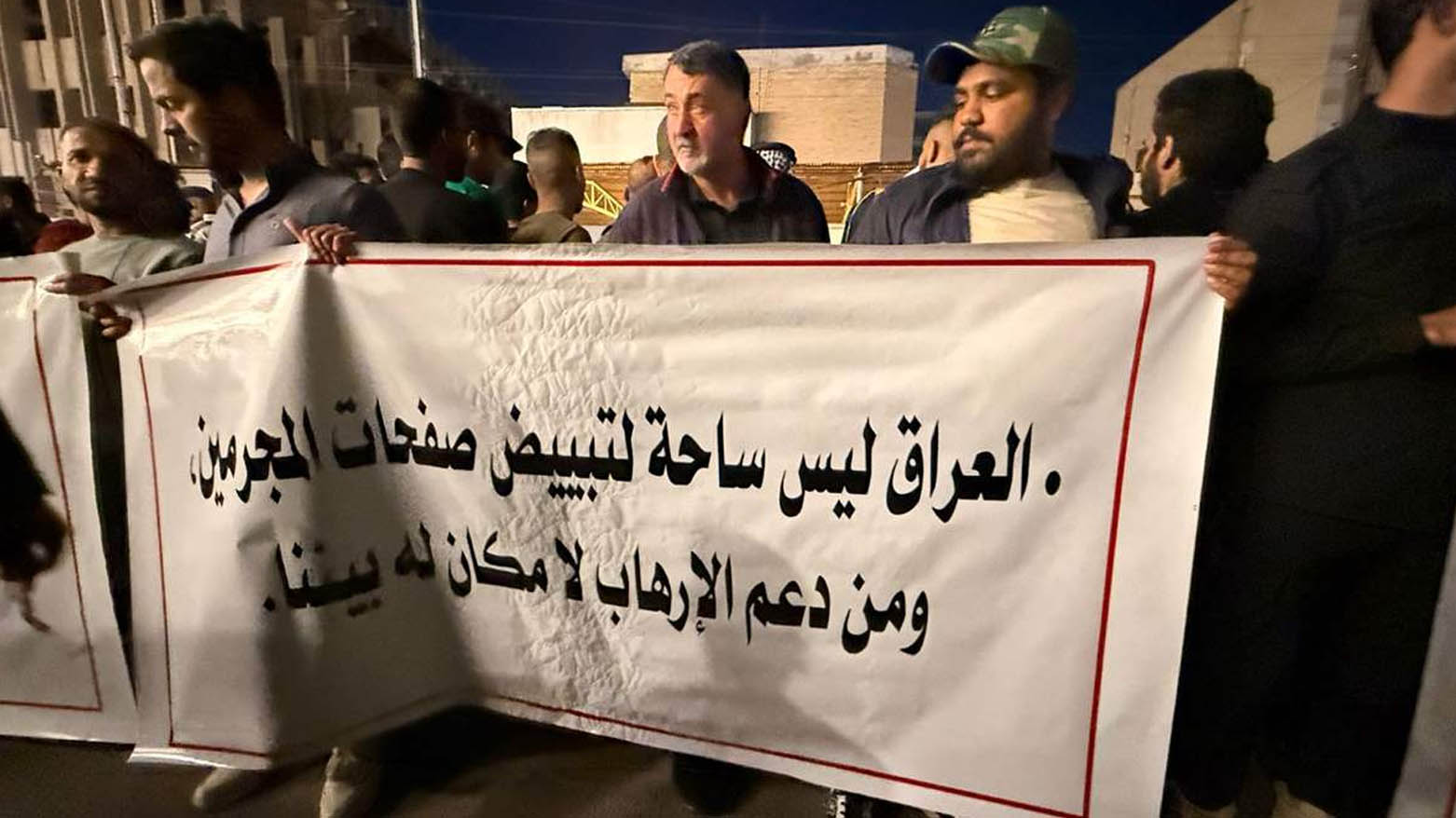Protests Erupt in Basra Over Syrian FM Visit to Iraq
According to eyewitnesses, the demonstrators chanted slogans rejecting his visit, carrying banners that read, "Iraq cannot become a station for whitewashing the faces of terrorists."

ERBIL (Kurdistan24) – The visit of Syrian Foreign Minister Asaad al-Shaibani to Iraq sparked protests in the southern city of Basra, with demonstrators voicing strong opposition to his meetings with Iraqi officials.
The visit, which was not previously announced, came at a time of heightened tensions in Syria following a surge in sectarian violence and a controversial constitutional declaration that has divided the country.
Iraq’s engagement with Syria’s transitional government has fueled controversy, with many Iraqis questioning the diplomatic outreach.
On Friday evening, dozens of Basra residents gathered outside the Foreign Ministry’s Consular Department office in the Jazair district, protesting al-Shaibani’s arrival in Baghdad. According to eyewitnesses, the demonstrators chanted slogans rejecting his visit, carrying banners that read, "Iraq cannot become a station for whitewashing the faces of terrorists."
The protest reflects deep-seated concerns over Iraq’s foreign policy approach toward Syria’s new leadership and the broader impact of recent developments in the war-torn country.
Al-Shaibani landed in Baghdad earlier that afternoon on an official visit that was not publicly disclosed beforehand. His schedule included meetings with Iraqi Prime Minister Mohammed Shia al-Sudani, Speaker of Parliament Mahmoud Mashhadani, and Foreign Minister Fuad Hussein.
Following these discussions, al-Shaibani and Hussein held a joint press conference, emphasizing the importance of regional cooperation and strengthening diplomatic ties between Baghdad and Damascus.
Read More: Iraqi and Syrian Foreign Ministers Discuss Joint Efforts to Combat ISIS
The protests in Basra came against the backdrop of escalating violence in Syria’s coastal regions, where the Syrian Observatory for Human Rights (SOHR) recently documented massacres that claimed at least 1,500 civilian lives, the majority of whom were from the Alawite minority.
According to SOHR, many victims were executed in their homes or agricultural fields, with security forces and allied militias accused of carrying out systematic killings. "These were not random acts of violence but systematic executions," said SOHR Director Rami Abdulrahman, who warned that the death toll could rise further as investigations continue.
Read More: Death Toll in Syria’s Coastal Violence Rises to 1,500 Civilians
The surge in violence in Syria was initially triggered by the arrest of a wanted individual in an Alawite-majority village in Latakia province, sparking clashes between pro-Assad militias and security forces. As tensions escalated, the country’s transitional presidency announced the formation of an investigative committee to examine human rights violations and determine those responsible.
Meanwhile, at least seven individuals were arrested earlier this week and referred to military courts for alleged crimes against civilians in the affected regions.
The United Nations Security Council has strongly condemned the violence, urging Syria’s transitional government to uphold the protection of all communities regardless of religious or ethnic affiliation.
"The widespread atrocities since March 6, particularly the mass killings of civilians in Alawite-majority areas, are deeply alarming and require immediate intervention," read a UN statement on Friday.
Beyond the security crisis, Syria’s newly introduced constitutional declaration has added another layer of discord. The announcement has sparked protests across the country, particularly in regions like Amuda, where demonstrators have rejected the document as exclusionary and undemocratic.
Read More: Syria’s New Constitutional Declaration: A Divisive Step Forward or a Setback for Pluralism?
Holding banners that read, "Syria is a country of many nationalities, ethnicities, sects, and religions," and "The Kurdish people in Syria are indigenous to their land," protesters accused the transitional government of failing to represent Syria’s diverse population.
"We do not accept a constitution that does not represent us," declared one protester, emphasizing the need for inclusive political reform.
The constitutional declaration, introduced by President Ahmed al-Sharaa’s interim government, enshrines Islamic law as the primary source of legislation and upholds a centralized power structure. While some view it as a necessary step toward stability, others, including the Kurdish National Council in Syria (KNCS) and the Democratic Autonomous Administration of North and East Syria (DAANES), argue that it marginalizes minorities.
"The declaration ignored Syria’s pluralistic nature and its identity as a multi-ethnic and multi-religious state," the KNCS stated, criticizing the document for reinforcing a singular national identity.
For many Kurds, Druze, and other minority groups, the new constitution represents a missed opportunity for pluralism. DAANES has expressed concerns that the declaration lacks recognition of Syria’s cultural, linguistic, and political diversity, threatening the decentralized governance model in Rojava.
Meanwhile, the Druze community has also voiced apprehensions, with some leaders visiting the Israeli-occupied Golan Heights in a symbolic move reflecting their fears over the future of their religious and cultural autonomy in Syria’s new political landscape.
Asaad al-Shaibani’s visit to Iraq takes place amid these mounting tensions, raising questions about Baghdad’s position on Syria’s transition. Iraq has historically maintained complex relations with its western neighbor, and while the Iraqi government seeks diplomatic engagement, the protests in Basra highlight significant opposition within Iraq to any perceived normalization with Syria’s new rulers.
Iraqi authorities have yet to comment on the protests, but the backlash underscores the political divisions surrounding Iraq’s approach to Syria. As the conflict in Syria continues to unfold, the Iraqi government faces a delicate balancing act—engaging with regional partners while addressing domestic concerns over security, foreign policy, and the broader implications of Syria’s internal turmoil.
The controversy surrounding Shaibani’s visit illustrates the intricate web of Middle Eastern diplomacy, where shifting alliances, historical grievances, and unresolved conflicts continue to shape international relations.
Whether further protests will emerge or the Iraqi government will seek to clarify its stance on Syria’s transitional government remains to be seen, but the visit has already reignited debates over Iraq’s role in the region’s complex political landscape.